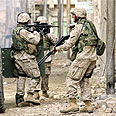
U.S. troops in Iraq
צילום: איי פי
The science of war
Like cancer, war must be studied scientifically to be beaten
I'm constantly asked whether game theory can bring about a resolution of the conflicts in the Middle East. My response, in several steps, is this:
1. It's unlikely to bring about a resolution, at least not directly. Game theory cannot provide a magic formula that will suddenly resolve a century-old conflict. No academic discipline can do that.
2. Game theory applies, at least in principle, to all conflicts; indeed, to all interactive situations. But it isn't specifically about the resolution of conflicts. It's about understanding conflicts. Once we understand conflicts, perhaps we can use some of these insights to try to resolve them. But the first aim is the simple understanding.
3. Specifically, I think that perhaps some game-theory insights do apply to the Middle East. I don't want to speak about that here—it's not what I'm getting the prize for—but there certainly is a conflict in the Middle East—a very protracted, grim, bitter conflict—and one would expect and hope that game theory applies there, and it does. But I'm not going to discuss this further here.
War studies
But it seems to me that perhaps we should change direction a little bit in our efforts to bring about world peace. Up to now all our efforts have been put into resolving specific conflicts: India–Pakistan, North–South Ireland, various African wars, Balkan wars, Russia–Chechnya, Israel–Arab, etc., etc.
I'd like to suggest that we should shift emphasis and study war in general.
War has been with us ever since the dawn of civilization. Nothing has been more constant in history than war. It's a phenomenon, not a series of isolated events. Efforts to resolve specific conflicts are certainly laudable, and sometimes they bear fruit.
But there's also another way of going about it - studying war as a general phenomenon, studying general characteristics, identifying common denominators and differences. Why does homo economicus - rational man - go to war?
Rational war?
Can war be rational? Unfortunately, the answer is yes. In his second inaugural address – one of the great speeches of all time - Abraham Lincoln said, "Both parties deprecated war; but one would make war rather than let the nation survive; and the other would accept war rather than let it perish. And the war came."
It is a big mistake to say that war is irrational. We take all the ills of the world—wars, strikes, racial discrimination—and dismiss them by calling them irrational. But it is not necessarily so. Though painful, they may be rational.
Once we understand that war is rational, we can at least somehow address the problem. If we simply dismiss it as irrational, we can't address the problem.
I'd like to do an economic analysis of war. Not about how to finance a war, how to rebuild after a war, or anything like that. Rather, about the incentives that lead to war, and about building incentives that prevent war.
To prevent war, an obvious solution might be to disarm, to lower the level of armaments. Right?
But in fact the opposite might be true. In the long, dark years of the cold war between the U.S. and the Soviet Union, what prevented war was the existence of nuclear weapons. Disarming would have led to war.
And so we see again, the bottom line is that we should start studying war, from all viewpoints, for its own sake. Try to understand what makes it happen. Pure, basic science.
That may lead, eventually, to peace. The piecemeal, case-based approach has not worked too well up to now.
The prophet Isaiah says that in order to reach a situation where nations beat their swords into ploughshares, one must have a central government, recognized by all. In the absence of that, one can perhaps have peace—no nation lifting up its sword against another. But the swords have to be there—they cannot be beaten into ploughshares—and the nations must continue to study war.










